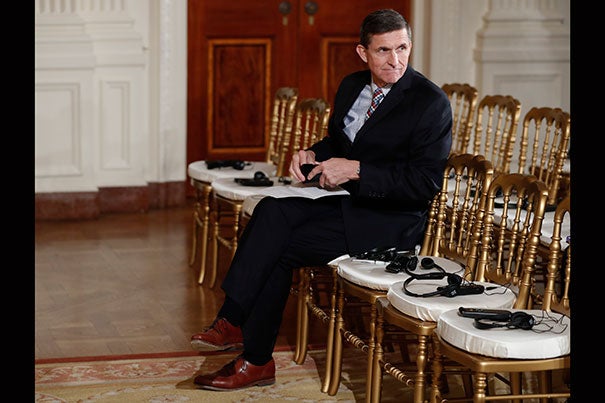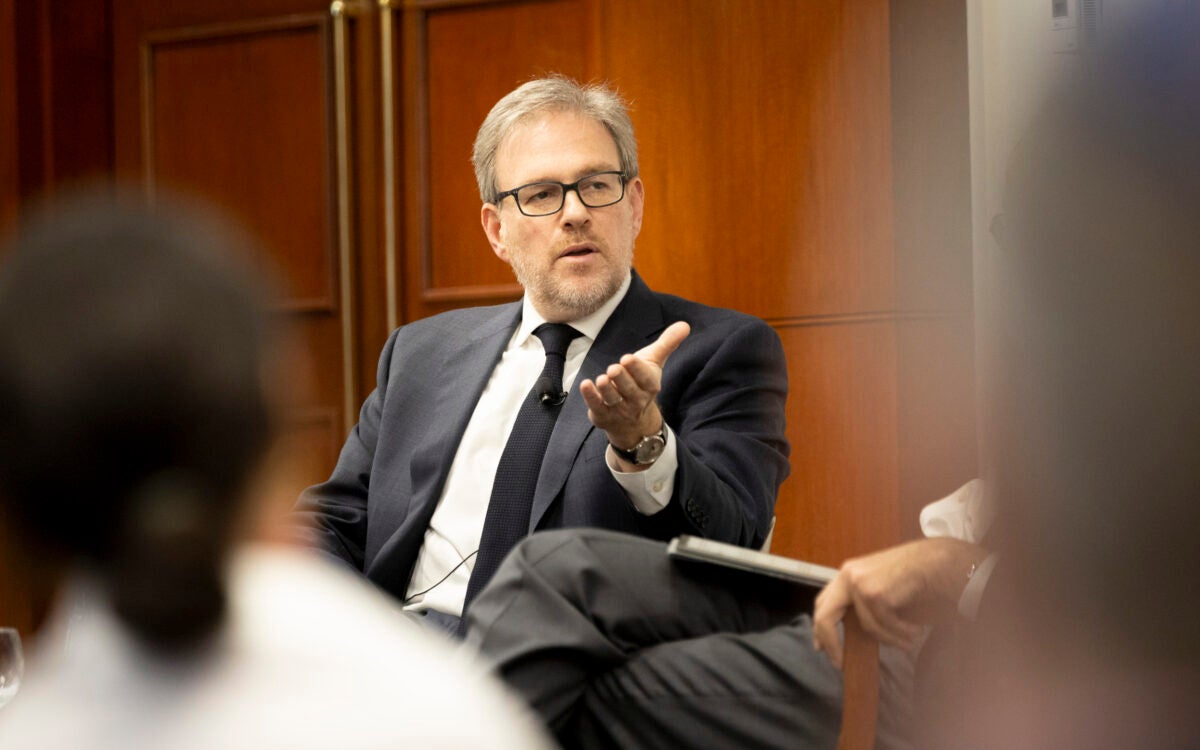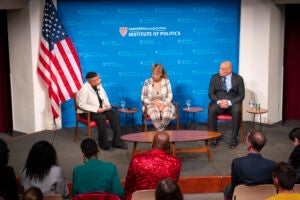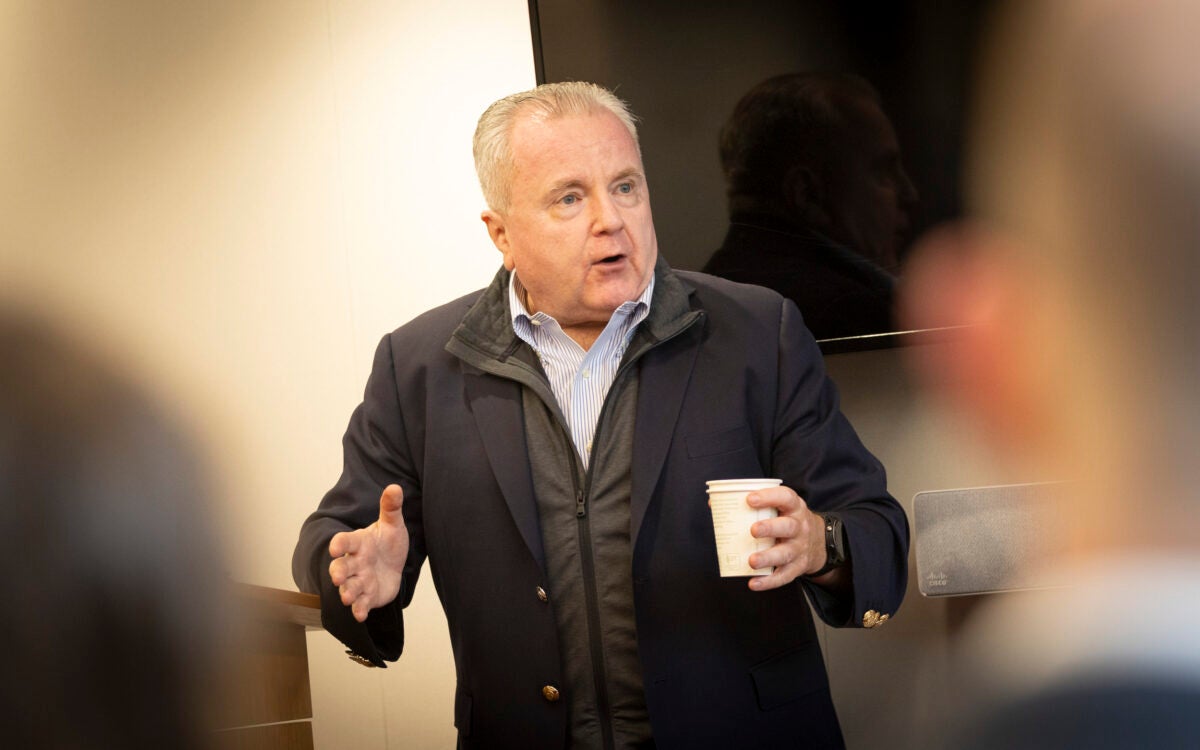U.S. intelligence: A ‘truth-devoted’ culture
In Q&A, former CIA official defends agency’s ethos, believes truth involving Russian issues will emerge
Washington has been rocked recently by news reports, citing federal intelligence agencies and the FBI, that said senior associates of now-President Donald Trump had frequent contact with Russian government officials during the 2016 campaign. News reports also said that during the transition, National Security Advisor Michael Flynn had phone conversations with the Russian ambassador about U.S. sanctions. Those reports led to Flynn’s resignation on Monday.
In a news conference on Thursday, Trump denied having contact with Russian officials and said he wasn’t aware of anyone in his inner circle doing so during the campaign. He also defended Flynn, blaming news leaks that he believes came from inside the U.S. intelligence community.
Rolf Mowatt-Larssen, now a senior fellow at the Belfer Center for Science and International Affairs, was director of intelligence and counterintelligence at the U.S. Department of Energy and was a decorated CIA intelligence officer. He discussed the nature of intelligence work, the belief structure that drives those who do it, the probe of Russian interference in the election, and the friction between the Trump administration and the intelligence agencies.
GAZETTE: Who enters into the intelligence community? What motivates them to take on jobs that are so complex and potentially dangerous for little or no public glory? Do they care about politics?
MOWATT-LARSSEN: Typically, they are very patriotic. Because we have such a duty to act independently and objectively in our work, most CIA officers keep our political views to ourselves. In my experience, most are very nonpartisan in how they go about their work, and they separate their work from their private views.
GAZETTE: So politics never clouds their thinking?
MOWATT-LARSSEN: I’ve almost never seen it. I’ve been operating in the field or in Washington, and I haven’t seen a problem with agency officers not being devoted to truth-seeking, as opposed to fulfilling anyone’s political agenda. You have to remember what we do. We recruit sources who provide information so that our policymakers will know what’s going on, we assess that information, we pass it on. That process requires a whole lot of discipline at every end. You have to vet your sources, you have to vet their information, you have to be very diligent about reporting it accurately and interpreting it correctly, if you’re analyzing it. So the agency is really a truth-devoted culture. I know it sounds idealistic, but it was certainly what I experienced in my 23-year career [with the CIA].
GAZETTE: Are you surprised about the amount of intelligence information the press has reported on lately? Do you think, as President Trump does, that the leaks are coming from inside the intelligence community?
MOWATT-LARSSEN: There’s always been a lot of information that’s leaked. It seems to be more than usual now. As a person who has mentored a lot of officers over the years, I would never condone leaking under any circumstances. It’s a crime. The president’s right. If there’s leaking of classified information, that’s wrong. It’s ethically wrong, on top of that. And it does politicize the agency if it’s occurring. At the same time, there are a lot of allegations being thrown around these days. I haven’t seen any facts that substantiate that CIA agency officers are the source of the leaks. I would be stunned if agency officers are not providing information to the president, which has also been alleged [in a Feb. 16 Wall Street Journal story]. CIA Director Mike Pompeo categorically denied that today in the media. And I would be stunned if agency officers are the source of these leaks. It could be coming from a lot of places. I don’t know why anyone would jump to the conclusion that it’s coming from the CIA itself.
GAZETTE: Who else has access to this kind of information — lawmakers, intelligence agencies in other countries?
MOWATT-LARSSEN: I don’t want to start pointing fingers, but yes, of course, other people are aware of the information. It’s been leaked, but we don’t know what’s been leaked, so it’s hard to make an assessment. I’m in touch with a lot of people in and out of government, and I haven’t come across anyone leaking anything or talking about things that have been leaked. I’m like everyone else, like all Americans, wondering what the “there” is. It’s too bad we have to have a discussion that’s been whipped into a sort of frenzy without having all the facts. The media also needs to be responsible in taking a fact-based approach to this, as opposed to just publishing things that it isn’t substantiating at this point.
GAZETTE: Can we draw any conclusions from the amount of time the investigation into Russian hacking has gone on without any definitive conclusion yet, or that multiple agencies, along with the FBI, are all working on this?
MOWATT-LARSSEN: I think we can draw conclusions on certain things, but we have to be very precise and exact in what we know and don’t know, and certainly not assume larger things and say “that happened.” Speaking not as an analyst but just as a citizen, I’m pretty confident that the Russians hacked into the DNC and tried to interfere with our election in some way. I have no idea whether some of these other allegations are true, whether it pertains to Mike Flynn or other people associated with the president, because I haven’t seen sufficient evidence to draw any judgments.

It’s important to understand how these processes work. There is a very disciplined process here. If the NSA [National Security Agency] or CIA collect information and assess it and think that a U.S. law may have been broken, those agencies are required by law to turn that over to the FBI for investigation, because, of course, the NSA and the CIA don’t have those investigative powers. At that point, the FBI is required to open a case and investigate the information. All that, to this point, is normal, and we should not infer that the subject is guilty because they’ve opened up an investigation. That’s the purpose of the investigation: to establish whether there’s any credibility to the allegations or information that’s been provided. If the FBI determines there may be something to it, then the FBI is required to refer it to the Department of Justice for possible prosecution, or at least further investigation. So that’s what we’re seeing, but we’re seeing it in a very disjointed, fragmentary way. You can’t, I think, draw any meaningful conclusions whether this or that is evidence of guilt.
I do agree with people who say that all this should be investigated thoroughly. It should be done properly, though, with procedures, and giving access to the congressional staffs. Particularly, the House Committee on Intelligence and the Senate Committee on Intelligence should have full access to the information that they need to draw their own conclusions.
GAZETTE: Is the “drip, drip” of information being reported by the press harming the investigation?
MOWATT-LARSSEN: This is a very complex case. It’s important to put out information as it’s received as long as it’s properly characterized and, if necessary, caveated. I often compare what I call media tradecraft to intelligence officer tradecraft. I think it’s very similar. If you’re a good reporter, you don’t want to hype things or get a scoop that’s inaccurate. You want to report the truth, and I think the responsibility to hold back and wait for proper information to emerge before publishing is just as important for an intelligence officer who wants to scoop something and get something to a high-level policymaker. There’s a temptation to be first. We all have that, but it’s really irresponsible when we’re dealing with issues this important to get right.
GAZETTE: If the investigation reveals some kind of cooperation or coordination between Russia and people in Trump’s circle, what would they do with that information, since the intelligence agencies are under the purview of the executive branch?
MOWATT-LARSSEN: The information would have to be reported through the chain of command, as it always is. At that point, senior people, whether it’s the CIA director, the FBI director, the DNI [director of national intelligence], would have to decide who in the White House to brief and how. This is all highly speculative, of course, but if persons [possibly involved] were still connected to people, then investigators would have to decide whether telling one person would potentially compromise that information to others. All of that would have to be taken into account. In some sort of extreme case, you could almost imagine a movie plot of how you would handle something like that. But you have to have some level of trust in the government to handle that properly because it’s in everyone’s interest to get to the bottom of it, and certainly to use the right standard of evidence to do that.
A lot’s been made in the last few days about people being reluctant to share information. I think it’s a naïve, unprofessional way to look at it. If you get to the point where you mistrust our government so that you don’t think you can share information, we’ve got a much bigger problem than sources and methods.
GAZETTE: So you’re skeptical of the Wall Street Journal story that intelligence officers are withholding information from the president because they don’t trust what he’ll do with it?
MOWATT-LARSSEN: I don’t believe that people are as concerned as the media is portraying. There may be people who are talking to the media who say they are. I’m not saying the media is lying about it. It may be fair reporting, but I don’t think it’s accurate reporting. Or, at least, I haven’t seen anything to suggest that’s true.
We deal with this all the time. There can always be penetration of a government. It doesn’t have to be someone willfully doing it, as we’re talking now, on a political level. It could be a mole or spy within the CIA or the FBI. I’ve been through the worst kind [of betrayal] by insiders with our spies and moles; it’s not something unprecedented. I haven’t seen anything that would cause me to think of this in those dramatic terms.
When issues are briefed, they generally don’t go into those specifics. I’ve personally been asked by presidents in the course of a briefing for details on sources. I answered the questions matter-of-factly and openly, and I would assume that would be the practice now. We have to be independent and objective, and we serve the policymakers. We can’t start getting into a situation where we selectively provide information, and I don’t think we have. Because the moment we start doing that, we become highly politicized, outside the norm. The norm is to try to do these things as a routine, as an established practice so that you don’t put yourself in a position of compromise. You always have to believe, if you want to be sober-minded, that our adversaries have us penetrated at some level of our government. If we need something like this to remind us that that’s a likelihood in our large bureaucracy that there are people in it who are passing along information and people who may betray our interests, then we’re simply being naïve.
GAZETTE: There’s been talk about “tensions” between President Trump and the intelligence community over negative comments he’s made that cast doubt on the competence and reliability of their work. Do you buy into the notion that people inside the intelligence world are angry about this and are retaliating?
MOWATT-LARSSEN: I don’t buy into that. The worst thing the agency or the intelligence community can do right now is get involved in politics or worry about what people say about them — just like the media have to go about reporting regardless what the president thinks about the media. A good reporter right now is not going to get so upset that he or she starts slanting reporting or reacting emotionally to derogatory comments. It’s not a good thing, certainly. I hope it stops and there’s a good relationship. I worry, at the macro level, that this “friction” that’s being represented could be exploited by our adversaries. People in the ranks just do their jobs. They’re inherently not political. The agency’s not a political place. Our job is too serious to submit to that.
GAZETTE: How do you interpret the announcements that Stephen Feinberg, a private equity business executive, will be hired to review the intelligence agencies, or that the Department of Justice will investigate the source of the Russia leaks?
MOWATT-LARSSEN: To be honest, that sounded like a terrible idea, bringing in somebody with no experience in intelligence. To me, it seems a little bit aimed at putting someone you trust in who could report back to you what’s really going on because you don’t have trust and faith in the people you’ve put there. I don’t see a proper role in that.
On the Justice Department’s investigating leaks, that’s normal. But the central issue here for me is what happened with the Russians and the hacking. I’d like to see as much outrage from high officials directed against the possibility of Russian interference in our politics as at the people who may have been so concerned about it that they chose to leak it. Which, again, I don’t condone that, but I can understand what’s happening.
GAZETTE: What will you be looking for in the coming weeks, and at what point do you become very concerned about what may be unfolding?
MOWATT-LARSSEN: I’d like to see the investigative effort proceed as fast as possible and on a nonpartisan basis to get to the bottom of this fully and thoroughly so the American people know what happened and will know the real story. And, at that point, move on. What I’m hoping is that the resolution of this will somehow bring us together in a way that we’re not now. Because it doesn’t help anyone’s interest that we’re tearing one other apart over this. It’s understandable while we’re in this process because it’s a very serious issue. I’m not one who’s dismissive of what the Russians have been up to, and what’s going on here. But at the same time, there are a lot of problems in the world, and there are a lot of things we need to do at home. So we need to get united to try and solve problems and put this behind us.
I’m a big believer in our system. I think it doesn’t matter as much if there’s an attempt to silence something, if there’s something there, because I’m convinced our system will reveal it in the right way.
This interview has been lightly edited for clarity and length.




